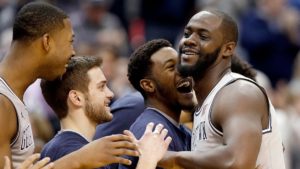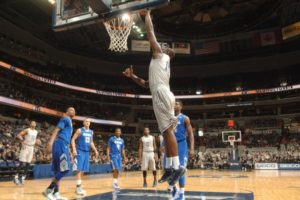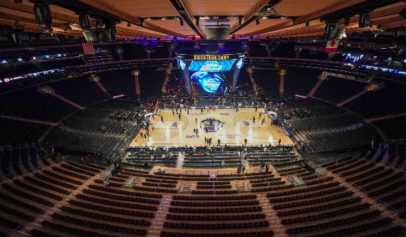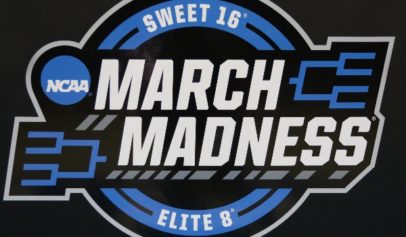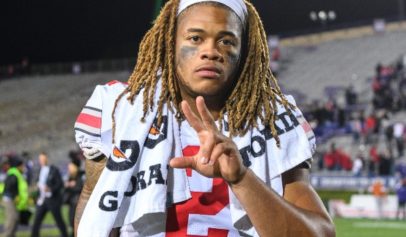Tyler Adams, a 6-foot-9 forward/center, signed with Georgetown four years ago with aspirations of being an influential player who would leave behind a powerful legacy by the time he graduated. Adams has done just that, just far differently than he, or anyone, expected.
After just four games as a freshman, Adams experienced severe chest pains. Doctors diagnosed him with arrhythmia—a condition that can be fatal—and Adams had to quit the sport he loved.
Since then, however, the Brandon, Miss., native remained an active part of the Hoyas, attending every practice in workout gear, every film session, while being a constant reminder and inspiration to his teammates that they are fortunate to have the chance to fulfill their athletic promise.
“Coming in, he was going to be the next Georgetown center,” coach John Thompson III told The Washington Post. “It hurt him. It hurt us. But he’s someone that has not pouted. He’s someone that has found a way to help this team, to make his teammates better in a totally different way than what any of us envisioned. We just wanted to give him a chance to get back out there.”
Thompson and Georgetown gave back to Adams in a way the left many in tears this weekend. The school petitioned the NCAA to allow Adams to dress for the final home game of his senior season, against Seton Hall. The normally inflexible NCAA granted the request, and so Thompson told Adams and his teammates in a meeting that he would get to play one last time for Georgetown.
“I thought it was a joke,” Adams said. “Everyone started laughing and it kind of shocked me, but everyone was excited when they heard the news.”
And so, Adams was introduced as a starter to open the Seton Hall game at the Verizon Center. His name hardly could be heard, the fans cheered so loudly for him. A tear rolled down his face.
Meanwhile, in the stands sat his father, Lonnie. Adams listed his dad as the most influential person in his life, and seeing his oldest son in uniform again gave Lonnie Adams indescribable pleasure.
“It’s been a long time since I’ve seen that,” Adams, smiling, told The Post.
As the players lined up on the court, Seton Hall did not contest the jump ball, allowing the Hoyas to gain possession. The ball wound up in Adam’s hands. The Pirates knew Adam’s story and, in a classy move, gave him a clear path to the basket. He threw down a left-handed dunk, and the crowd exalted.
Georgetown fouled immediately to stop the clock and allow Adams to exit the game to a standing, tearful ovation.
Most people want 15 minutes of fame. Adam’s 15 seconds of action did his heart good.
“It brought back memories,” Lonnie Adams said. “Emotional. Very emotional.”
For his part, Tyler Adams said he had not dressed for a game in so long, “It felt a little weird, at first. . . I’m used to being in a suit. But it felt good to get an opportunity to do warm ups, to see how it really feels to be a player.”
For Adams, who graduates in May, it was the culmination of four years that became more rewarding for those around Adams than for him. And the fact that he was OK with that speaks to who he is.
Adams was born with an irregular heartbeat and underwent an operation at age 6. He never had issues with his heart until Dec. 3, 2011.
“When my situation came about I didn’t want to mourn or be sad and be a burden on the team,” Adams said. “My main focus was just keeping a positive energy and helping the guys out. Whether that was wiping the floor or helping Josh (Smith) or Mikael (Hopkins) with their next post moves, the main focus was just helping the team as much as I could.
“I’m not the type of person who gets down on things because I know in life people have it worse than I do. So that was the approach I took with it and that’s what helped get through the emotions I may have had. Coach Thompson has made me feel like I’m part of the team. I dress for practice, attend every work out and I probably watch more film than the guys who play so I definitely feel like I’ve been involved and that definitely helped me out emotionally.”
In a classy move, Seton Hall coach Kevin Willard, who had not spoken to Thompson about Adams playing, had read about the young man and instructed his team to not defend him once he got the ball.
“I told my kids before the game,” Willard said, “‘Sometimes there’s a bigger picture…Great kids should be rewarded in life.’”
